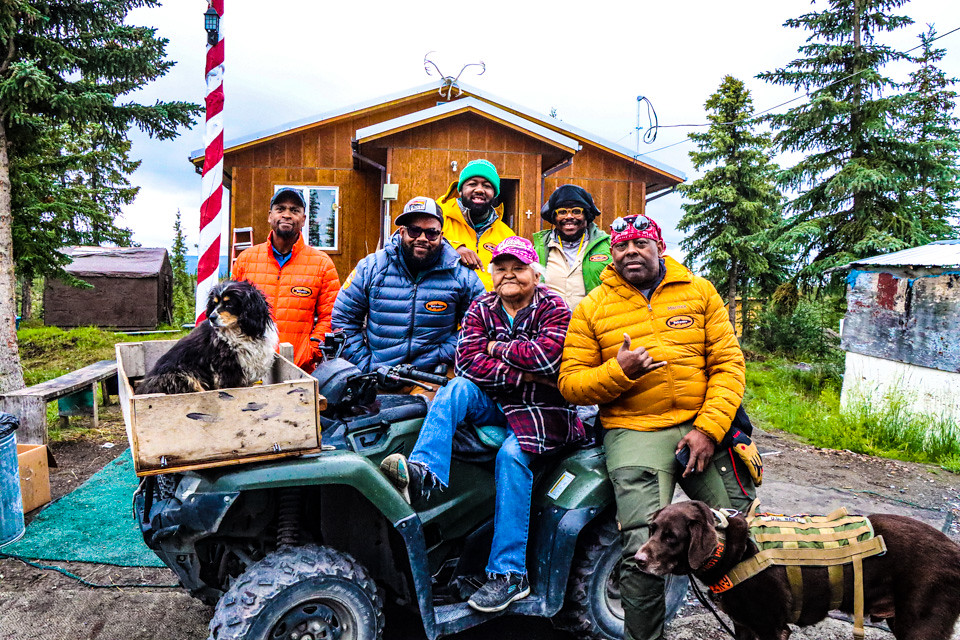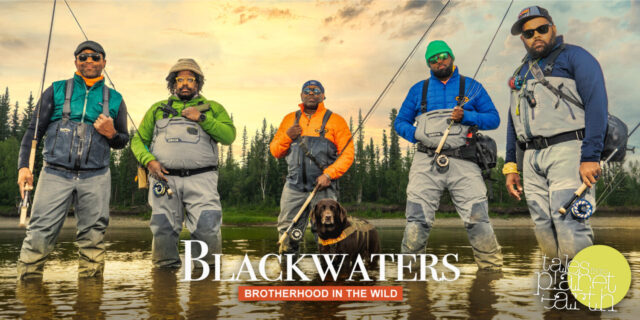A new documentary hosted by The UW Nelson Insititute’s Tales from Planet Earth film series called “Blackwaters: Brotherhood in the Wild” follows five Black men on a fly fishing adventure into the Gates of the Arctic Circle National Park. The first screening was held Saturday evening, and two more additional screenings will be held today and Monday.
“Blackwaters” follows a group of five Black men on a journey to and through the Arctic National Wildlife Refuge as they navigate topics of being in nature as a Black person, environmental justice, and the effects policy and industrialization have on Indigenous populations.
The cast are all active in their local cities in bringing accessible and comfortable ways for Black people to get out in nature including: Chad Brown of Portland, Oregon, and his organization Love is King; James Edward Mills of Madison, Wisconsin, and his organization Joy Trip Project; Jahmicah Dawes of Stephenville, Texas, and his outdoor shop Slim Pickins Outfitters; Nick Brooks of Atlanta, Georgia, and his organization Outdoor Gear and Beer; and Alex Bailey of San Antonio, Texas, and his organization Black Outside, Inc.
James Edward Mills, local author, freelance journalist, and nature lover, spoke on how coming together with the four other men for a happenstance fishing at a conference sparked their interest in bringing those same conversations of being Black in nature to a wider audience.

“We wanted to make it a higher-level event,” Mills told Madison365. “The National Park Service has provided funding for this project to be able to take it to the five communities that we’re each from so that we can have a high-level community engagement opportunity. It basically is providing us with the funds to be able to fly everybody out to each one of the locations, to be able to secure a venue, and to arrange a day of fly fishing for people in the community who would like to join us. All the things that we would love to be able to do by ourselves, but this is something that we’re actually able to make happen collectively.”
Through the help of Chad Brown’s Soul River Inc., the group was able to fly out to the remote destination in the northeastern corner of Alaska to both set a precedent for Black people claiming space in nature, while also drawing attention to the importance of environmental justice. Something the inclusion of people from the Gwich’in Nation in the documentary speaks to.
“The Arctic National Wildlife Refuge is an area that is home to the Gwich’in people, a Native American tribal community that has been on this land for thousands of years,” said Mills. “Their entire livelihood, to this day, is still built around the notion of environmental protection. A lot of us talk about that in very ambiguous terms, but they mean it very specifically. In the sense that their entire cultural, dietary, and economic livelihood is built around the migration of the Porcupine Caribou.”
Mills spoke on the brashness of politicians and policy-makers who misrepresent and mistreat land based on sometimes misguided but all-too-often malicious ideas of who and what is already on the land. Speaking directly on the impact of drilling and building disruptive infrastructure such as oil pipelines, Mills made it clear that the documentary also serves to remind people of how they too can start to shift their thoughts and actions to be aware of the impact.
“The purpose of the film and this expedition, in addition to demonstrating the importance of what it is to be a Black man in the outdoors, is also being able to create a direct relationship between a distant remote wilderness area that we are directly impacting through our culture and in our economy here in the lower 48 United States,” Mills stated. “The goal ultimately, is for us to start thinking about how our local impacts directly relate to land and water resources right here in Wisconsin. The people who will see this film will probably never make it to Alaska, and will probably never make it to the Arctic National Wilderness Area. However, they will make it to Devil’s Lake, hopefully, or they’ll make it to the Wisconsin River.”
Making environmental justice not just a remote issue, but a local issue, is surely a key goal of the screenings. Mills was also happy to share that they would be visiting the home cities of each cast member for screenings and activities, and full information for the Madison events can be found here.
“The most important thing is that I want people to see themselves in whatever capacity they’re most comfortable in. You don’t have to go all the way to Alaska. You can have a very enjoyable experience by visiting a Madison lake, or going outside and visiting a Madison park. Walking the Ice Age Scenic Hiking Trail, a division of the US Forest Service and the National Park Service that runs right through Madison,” said Mills, mentioning the proximity that Madison has to 11 other scenic hiking trails and the importance of fighting back against the narrative that people do not value the environment around them.
“I think that we can continue to demonstrate that the land and water resources are there for everyone to use, if we use them. The problem though, is that if we don’t use them, and demonstrate that to people whose power it is to maintain these things, we will lose them.”
Today’s screenings will see offerings like fly fishing in the morning offered by Dane County Parks before a fishing demonstration and movie screening at the Lussier Family Heritage Center followed by a Q&A.
Monday’s screening will be from 6:30-8 p.m. at the Marquee Cinema at Union South on the UW-Madison campus and will also be followed by a Q&A. Register for the events here.




























